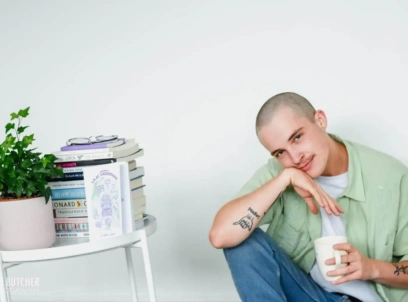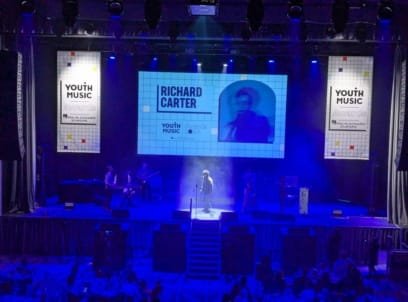KATYA is an artist who truly encompasses what it means to do it all: she is a singer, songwriter, producer, sound engineer, mixes her own tracks… there is very little that she can’t do. She is driven by her deep-rooted passion for music, which has been developing ever since she was a little girl.
Born and raised in London, she began her musical journey through classical learning of the piano and the violin, and later experimenting with electric guitar and songwriting at the age of twelve. As music quickly became an all-consuming hobby, she would play in school competitions and even sneak into open mics before she turned eighteen. Ever since completing her academic studies at Oxford and a master’s degree in London, KATYA has been establishing herself as one of the UK’s leading emerging artists.
Even from solely listening to her music, I immediately got the sense that KATYA knew how to make the audience feel as if they were being directly spoken to. With her most recent single ‘Garden In The Sky’ having just come out, she is pushing boundaries to reflect on her view of the world and the issues our society continues to struggle with.
In this interview, KATYA discusses what inspires her music, as well as her experience in the music industry and often male-dominated, challenging nature. She then walks explores her artistic process and performance style, while also looking back at the highs of her career, and where she hopes the future will take her. This conversation is a glance into her own artistic world.
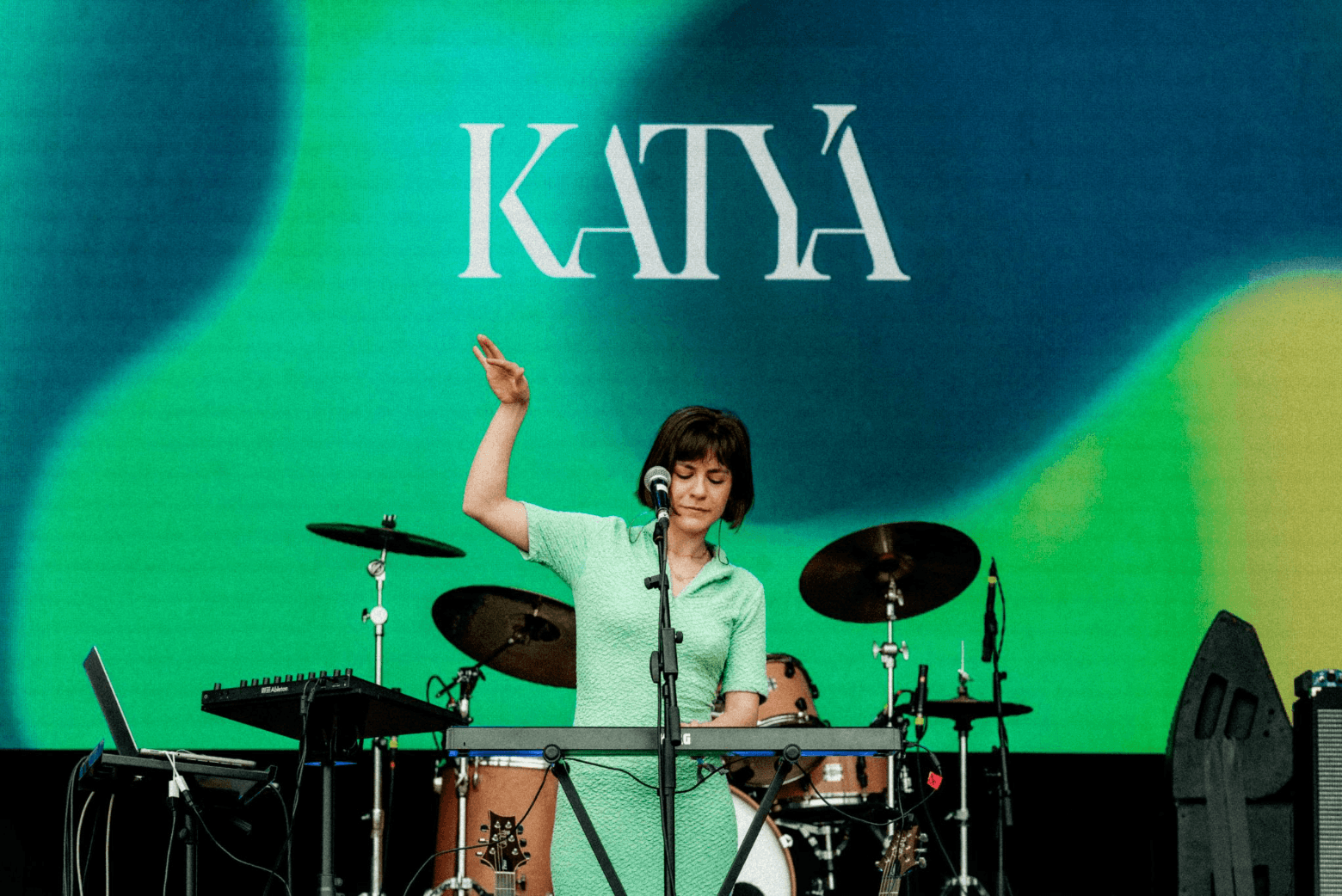
On Inspiration
What would you say has been most inspiring for your music?
The process comes from the music side first – I experiment with sound and the instruments. Usually there’s something I’ve been thinking about, and then that will flow naturally into what I’m writing. My subconscious starts the process and then I pick up on it after that.
On the music industry
What kind of aspects of the music industry were most intimidating to you when you began?
The lack of obvious route to achieving your goals. I didn’t find that there was a huge amount of guidance, despite having done a master’s. It’s also quite a confusing process to learn about yourself when you’re in the arts. I played in a band for a while, which was cool because it allowed everyone to bring in ideas, but I didn’t yet know what I wanted or how to vocalise that.
And when would you say your view of yourself as an artist clicked?
I made a decision at one point to produce my own music, originally using Logic [she now uses Ableton], and that let me experiment more. At first, I’d doubt how good I was. I would go into the studio, and there would be guys, really nice guys, but they were always guys! My mum was the one who pointed out to me: ‘What makes him more of a producer than you?’
The turning point was when I started to back my own work and approached a big mixing engineer [Spike Stent], offering to send my music to him. He ended up mixing my lead single, and so I thought that if he sees my production as good enough, then I’m okay. It’s helpful to have external validation as well.
My mum was the one who pointed out to me: ‘What makes him more of a producer than you?’
What inspired you to take on music production?
When I’d go into the studio and co-write, I’d often come away with music that I didn’t feel I wanted to release. Maybe if I’d had a really strong idea of all the elements that I wanted it would have been easier, but I was in a stage of experimentation. Sometimes we’d come out with music that was too poppy for me, and it’s tricky to balance out everyone’s input.
Being a female producer in a male dominated industry, what would you say is the biggest struggle?
Standing up for the fact that you’re just as good as someone else. We’re so used to seeing men doing those roles, so we need to make a bigger effort to show our capability. ‘We need to be more vocal and champion female producers!’
‘We need to be more vocal and champion female producers!’
Do you believe an artist can be truly independent, or does the industry require reliance on other professionals to gain prominence?
You can get quite far independently, but it’s a lot of work. It’s about gauging the extent to which people can actually help you. You can sign with a label, but they might not get more than what you could do on your own. I put in a lot of work, and previously when I’ve had the opportunity to be signed by a label, I didn’t get the impression that they would do more than what I do on my own. It’s been good to have learnt all these aspects of the industry, because I can now articulate exactly what I would want help with.
Do you feel that being self-sufficient and giving your time to being your own producer, mixer, sound engineer and booking agent takes away time that could be spent focusing on your creative process as an artist?
Probably to an extent. But it’s a balance between doing that now and being open to working with people once you’ve raised your profile. I’ve noticed that having done those things myself and having the intricate knowledge means I can guide people I’m working with more towards the result I want.
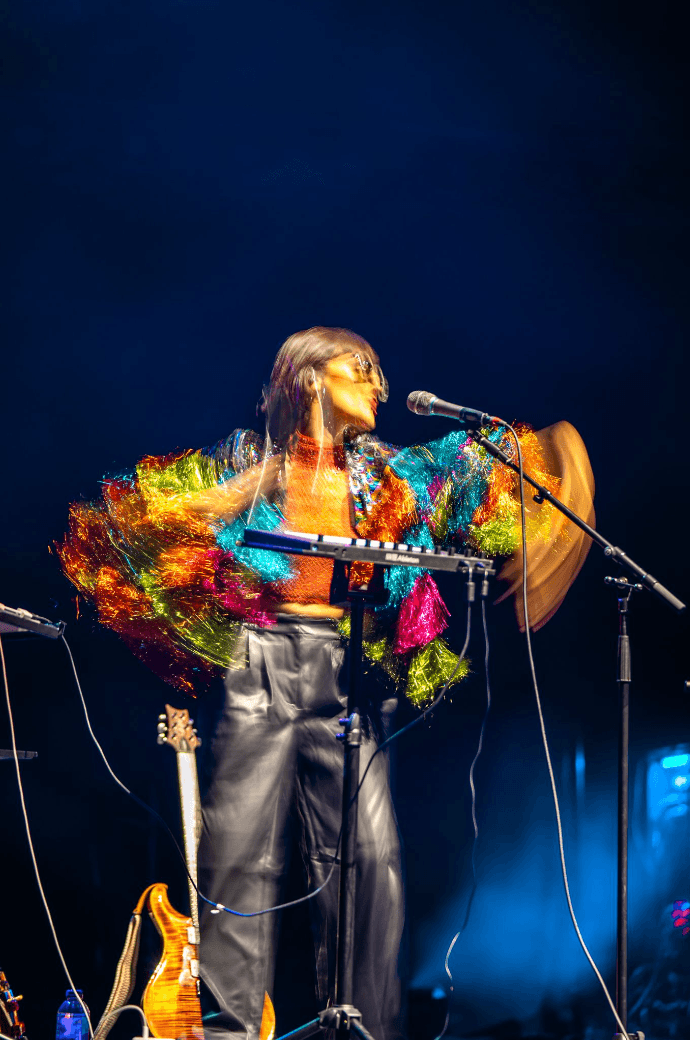
The meaning behind KATYA’s music and her approach
Your first track, ‘I’ll Take Your Number’, was mixed by Spike Stent, but your new single ‘Garden In The Sky’ is mixed entirely by you. What made you decide to work independently on this song?
A mix can really change a track’s “sound”, so with this one I had it up to a point and wanted to take it all the way – creating a wide stereo mix to immerse the listener. ‘I knew what I wanted, and it was a good experiment.’
‘I knew what I wanted, and it was a good experiment.’
‘Garden In The Sky’ refers to the anti-lynching song ‘Strange Fruit’. What made you choose lynching specifically as a point of human shortcomings in highlighting the importance of finding a better world?
I watched the documentary ‘Hubble: The Wonders of Space Revealed’ and had a zoom-out perspective, and around that same time the George Floyd murder had taken place. This was a central thing I was thinking about, which fed into the reference. I wanted to talk about people who’d been displaced and impacted negatively by our society.
You have another very powerful, very emotional song called ‘I’ve Known War’. What place do you feel that song has now, amid global conflicts?
I felt a deep sense of empathy due to my connection to the disputed area of Nagorno-Karabakh (I have roots there) and an outpouring of sympathy for the people. This song was my natural reaction, but it stands separate from my other work. It’s sad that it’s relevant always and particularly now.
Was the idea of addressing global issues through music something that was shaped by your childhood?
Funnily enough I think it was! I remember writing a song along the lines of ‘Is this a fight worth fighting for? Are we marching for peace amongst unjust laws?’ Like where did that come from? (laughs) There seemed to be an undercurrent of something on my mind.
When you struggle with artistic block, what kind of processes help you get back into music-making?
Being playful with music. To open other ways and methods of creating, whether that’s through technology or instruments. At the moment I’m writing three pages every morning, which I’ve never done before. There’s always something to say but sometimes we get caught up in other aspects of life. I try to turn my phone and other distractions off; everything always could be important, but it’s about putting that aside for a while to have the space to create.
On KATYA’s performance style
Your performances are very intimate and immersive with their use of light and colour. Are there any specific ways in which music has helped you connect to yourself, or to others?
I try and be myself on stage, drawing people into the world that I’ve created through my music. I’d love to have more visuals eventually… Being on stage, it’s difficult to know for sure how it’s being translated to people, but they seem to resonate with what I’m singing and writing about. Every time I perform, I develop a new connection to the songs. It’s like this hyper energy that I feel from the people in the room, which reconnects me to the songs every time. When you perform, you get the chance to relive that initial feeling of creating the song, and you get to share that with the audience.
‘It’s like this hyper energy that I feel from the people in the room, which reconnects me to the songs every time.’
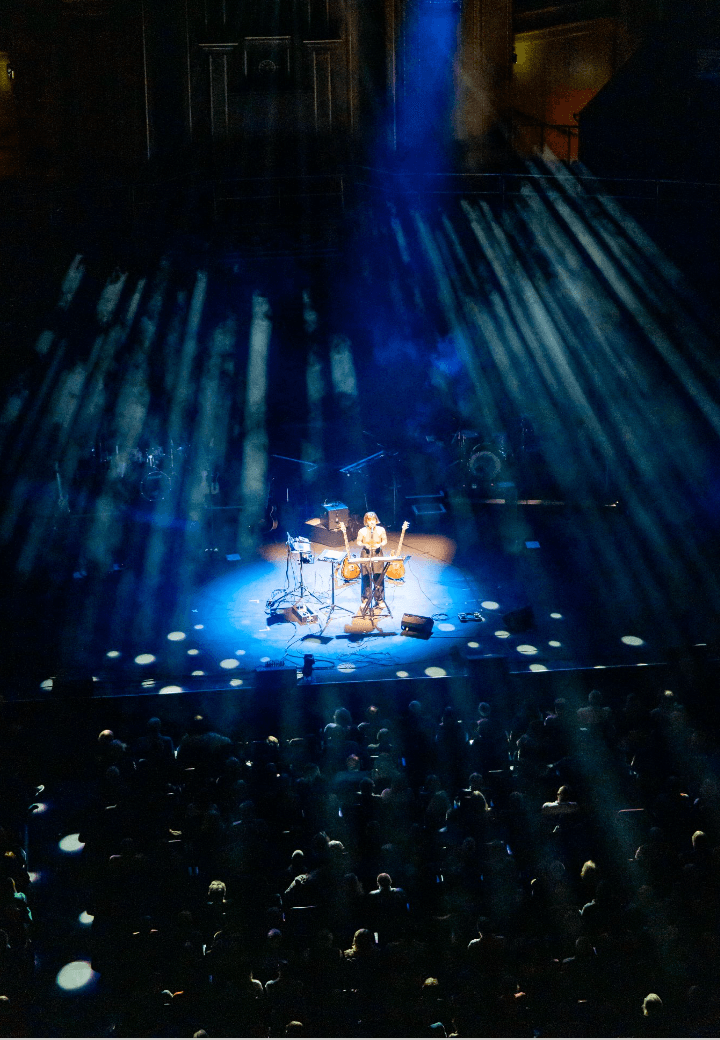
How can music be used as a tool to bring together communities and foster social justice?
Music is one of the most powerful ways of bringing people from different views together. As humans we really want to hold onto our beliefs, but if we can spread a message of unity and give people a different perspective through music, then that can be a way to bring people closer and have empathy.
And tell me a little bit about your alter-ego, Kiki. What’s her place in your music?
I was just having fun and I put it out on Instagram, and people wanted to see Kiki as part of the live shows. It is quite different but it’s also the other side of my personality. I’ve always been conscious of having to put myself in a box in music to have a ‘sound’. I’m interested in how you put a show together and where you take people. It would be a shame to not show those sides of me.
Reflecting on the now, and on the future
If there was one thing you could change about the music industry, what would it be?
The barrier to entry; it’s definitely better than it was, but it can be hard to navigate. It would be good to have more programs where artists could be informed on different aspects of the industry.
What has so far been the highlight of your career?
The tour I just did. It was just next level, or a few next levels. It solidified the aspects that I love about making music: sharing it with people and getting their reactions. So much of music-making is lonely, so being able to do shows and talk to people reminds me why I love doing it.
What are you working on currently? What can your listeners get excited about in the near future?
I’m releasing my EP with three more tracks to come out, and I’m in the initial stages of working on my album. I feel ready to be making new music, and this tour has let me imagine what I can do on stage. I’ve started allowing myself to envision things that I used to not think were possible. I’m no longer creating in isolation but thinking of how that will translate to live-performance.
If you could give one piece of advice to young women trying to get into the music industry, what would that be?
Try to keep believing that you’re good enough. You need to back yourself in this industry, because no one else will do that for you. Practice what you want to be good at and reach out to lots of people for advice. If you’re persistent and don’t feel rejected when you aren’t answered, you will get responses, and it will move.
‘You need to back yourself in this industry, because no one else will do that for you. ‘
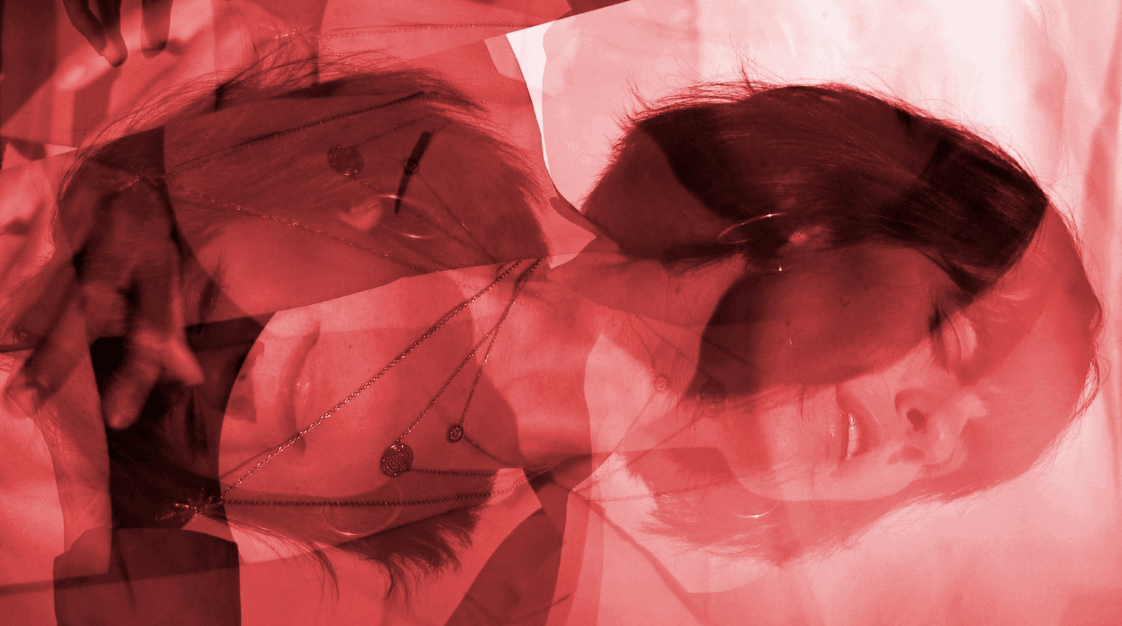
—
See more of KATYA: https://www.katyatheartist.com/
Instagram: @katyatheartist
Spotify: https://open.spotify.com/artist/6ARtMKoXQvZclVIxRqMFBQ?si=9Cej9lQ8TZe_o7KxZM169Q

